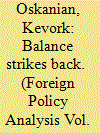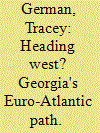|
|
|
Sort Order |
|
|
|
Items / Page
|
|
|
|
|
|
|
| Srl | Item |
| 1 |
ID:
148157


|
|
|
|
|
| Summary/Abstract |
Tbilisi’s recent foreign policy presents analysts working from a balance-of-power perspective with something of a puzzle: with Russia very much the regionally dominant power, against the predictions of structural-systemic theories, small state Georgia has ended up balancing against, rather than bandwagoning with, great power Moscow. As a result, domestic, ideological explanations that implausibly ignore or minimize interstate considerations of power have predominated in analyses of Tbilisi’s foreign policy. In response, this essay examines Georgia’s post-Soviet foreign policies from a neoclassical realist theoretical viewpoint, combining systemic, balance-of-power and domestic ideological factors: throughout the period under review, Tbilisi’s policies were thus due to ideologically conditioned perceptions of shifting power-political realities in its neighborhood, with an ideological adherence to liberal norms playing a particularly important role in distorting these perceptions during the Saakashvili administration. Through this combination of power and ideology, neoclassical realism ends up providing a more comprehensive and continuous account of Tbilisi’s shifting policies since 1992 than either domestic or alternative realist frameworks, like balance-of-threat theory, or omnibalancing; as an important implication, Georgia’s, and other former Soviet states’ continued pro-Western orientation will depend as much on their perceptions of the West’s continued commitment to regional power projection as on domestic ideological preferences.
|
|
|
|
|
|
|
|
|
|
|
|
|
|
|
|
| 2 |
ID:
138951


|
|
|
|
|
| Summary/Abstract |
Events in Ukraine in 2014 are likely to transform the presence and role of western institutions such as NATO in the post-Soviet area. The crisis has starkly revealed the limits of their influence within Russia's ‘zone of privileged interest’, as well as the lack of internal unity within these organizations vis-à-vis relations with Moscow and future engagement with the area. This will have long-term implications for the South Caucasus state of Georgia, whose desire for integration into the Euro-Atlantic community remains a key priority for its foreign and security policy-makers. This article examines the main motivators behind Georgia's Euro-Atlantic path and its foreign policy stance, which has remained unchanged for over a decade despite intense pressure from Russia. It focuses on two aspects of Georgia's desire for integration with European and Euro-Atlantic structures: its desire for security and the belief that only a western alignment can guarantee its future development, and the notion of Georgia's ‘European’ identity. The notion of ‘returning’ to Europe and the West has become a common theme in Georgian political and popular discourse, reflecting the belief of many in the country that they are ‘European’. This article explores this national strategic narrative and argues that the prevailing belief in a European identity facilitates, rather than supersedes, the central role of national interests in Georgian foreign policy.
|
|
|
|
|
|
|
|
|
|
|
|
|
|
|
|
|
|
|
|
|